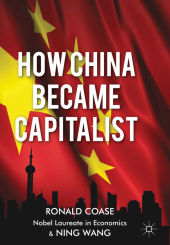 Neuerscheinungen 2012Stand: 2020-01-07 |
Schnellsuche
ISBN/Stichwort/Autor
|
Herderstraße 10
10625 Berlin
Tel.: 030 315 714 16
Fax 030 315 714 14
info@buchspektrum.de |

Ronald Coase, Ning Wang
(Beteiligte)
How China Became Capitalist
2012. 2012. xi, 256 S. w. 1 map. 229 mm
Verlag/Jahr: SPRINGER PALGRAVE MACMILLAN 2012
ISBN: 1-13-735143-8 (1137351438)
Neue ISBN: 978-1-13-735143-2 (9781137351432)
Preis und Lieferzeit: Bitte klicken
How China Became Capitalist details the extraordinary, and often unanticipated, journey that China has taken over the past thirty five years in transforming itself from a closed agrarian socialist economy to an indomitable economic force in the international arena.
The authors revitalise the debate around the rise of the Chinese economy through the use of primary sources, persuasively arguing that the reforms implemented by the Chinese leaders did not represent a concerted attempt to create a capitalist economy, and that it was ´marginal revolutions´ that introduced the market and entrepreneurship back to China. Lessons from the West were guided by the traditional Chinese principle of ´seeking truth from facts´. By turning to capitalism, China re-embraced her own cultural roots.
How China Became Capitalist challenges received wisdom about the future of the Chinese economy, warning that while China has enormous potential for further growth, the future is clouded by the government´s monopoly of ideas and power. Coase and Wang argue that the development of a market for ideas which has a long and revered tradition in China would be integral in bringing about the Chinese dream of social harmony.
Preface China at the Death of Mao China in Transition How China´s Market Reform Began A Bird in the Cage: Market Reform Under Socialism Growing out of Socialism: Capitalism with Chinese Characteristics From Capitalism to Capitalisms
"Patient readers will be rewarded with a better and deeper understanding of the most extraordinary transformation in modern economic history." - The Wall Street Journal "As China is sure to become a hotly debated focal point in the presidential election, this book, with its emphasis on markets and history, becomes of paramount importance." - The Washington Times "Anyone curious as to how China became the world´s second biggest economy should read this interesting book." - The LSE Review of Books "This is a major contribution to the whole literature on economic change as well as on China. Nowhere in all of the literature on economic change and development that I know is there such a detailed study of the fumbling efforts of a society to evolve and particularly one that had as long and as far to go as China did." - Douglass C. North, 1993 Nobel laureate in Economics "Ronald Coase, now 100 years plus, and Ning Wang have written a compelling and exhaustive commentary about China´s fitful transition from Socialism under Mao to today´s distinctive capitalist economy. No student of China or socialism can afford to miss this volume." - Richard Epstein, University of Chicago Law School "This book is one of the greatest works in economics and in studies of China, not only for today, but for the future." - Chenggang Xu, University of Hong Kong "Coase finds a nation whose philosophy and policy have reflected the same simple principle - ´seeking truth from facts´ - that has inspired his own path-breaking analyses of firms, markets and law. A fascinating and exceptionally thought-provoking account of how China, repeatedly seeking more efficient socialism, found itself turning capitalist." - Stephen Littlechild, Emeritus Professor, University of Birmingham, and Fellow, Judge Business School, University of Cambridge


